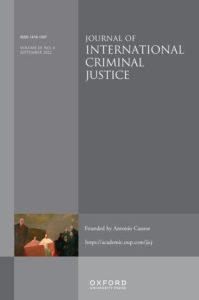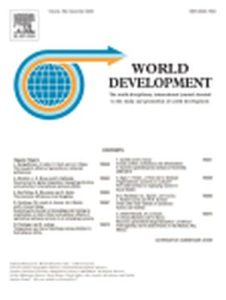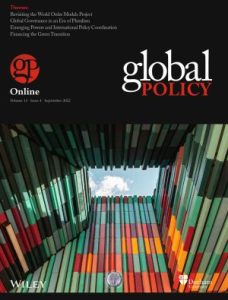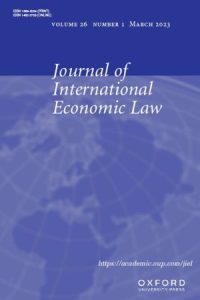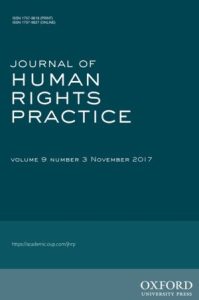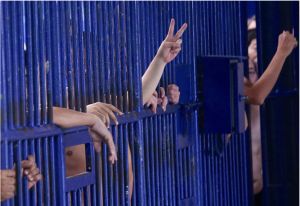Academic Articles
2023
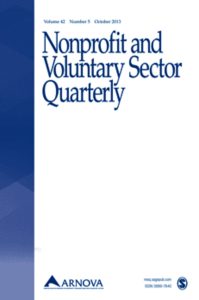 Benjamin, L., A. Ebrahim, and M.K. Gugerty (2023). “Nonprofit Organizations and the Evaluation of Social Impact: A Research Program to Advance Theory and Practice,” Nonprofit and Voluntary Sector Quarterly (50th Anniversary Special Issue), 52(1S): 313S-352S.
Benjamin, L., A. Ebrahim, and M.K. Gugerty (2023). “Nonprofit Organizations and the Evaluation of Social Impact: A Research Program to Advance Theory and Practice,” Nonprofit and Voluntary Sector Quarterly (50th Anniversary Special Issue), 52(1S): 313S-352S.
This article proposes a research program with two goals: (a) to support nonprofit leaders to productively engage evaluation and (b) to advance a meso-level theory of nonprofit evaluation that recognizes the diverse ways nonprofits contribute to social change. Such a research program is timely, as evaluation becomes increasingly institutionalized in the sector in ways that constrain nonprofit leaders from engaging productively with evaluation to advance their social impact. This research program brings existing nonprofit scholarship into conversation with evaluation scholarship and puts forward a research agenda organized around the practical dilemmas facing nonprofit leaders as they answer four key evaluation questions: what to evaluate, for what purpose, using which criteria, and with what evidence and methods. By anchoring a research program around these four questions, we seek to reopen the possibilities for how scholars can support nonprofit leaders in engaging evaluation to enhance their social impact.
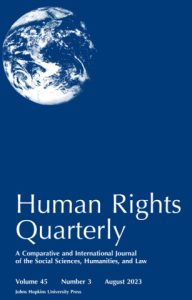 Odinkalu, Chidi Anselm “Advice without Consent? Assessing the Advisory Jurisdiction of the African Court on Human and Peoples’ Right”, (forthcoming in 45:3 Human Rights Quarterly, August 2023)
Odinkalu, Chidi Anselm “Advice without Consent? Assessing the Advisory Jurisdiction of the African Court on Human and Peoples’ Right”, (forthcoming in 45:3 Human Rights Quarterly, August 2023)
Despite enduring prolonged skepticism, Africa’s regional human rights has a
complex architecture of institutions, norms, procedures, and jurisprudence.
A major entity among these institutions is the African Court on Human
and Peoples’ Rights. In existence for over one and a half decades, the
Court remains an institution in transition. With an identity defined mostly
by its contentious jurisdiction, the significance of its advisory jurisdiction
has been neglected. Three hundred eight cases (95.36 percent) of the 323
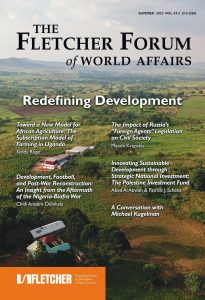 Odinkalu, Chidi “Development, Football, and Post-War Reconstruction: An Insight from the Aftermath of the Nigeria-Biafra War, The Fletcher Forum of World Affairs; 26 June 2023
Odinkalu, Chidi “Development, Football, and Post-War Reconstruction: An Insight from the Aftermath of the Nigeria-Biafra War, The Fletcher Forum of World Affairs; 26 June 2023
The role of sport in the processes of state building, development, and post conflict reconstruction is a subject of considerable debate and disagreement. This article engages with this debate with attention to a case study of how a football1 club—Enugu Rangers International FC—helped to advance reconstruction and state building after the Nigeria-Biafra Civil War, which ended in 1970. It argues that sport can be a significant catalyst in establishing the conditions necessary for the pursuit of development.
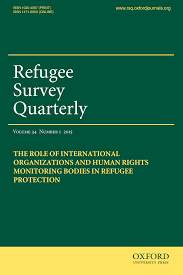 Odinkalu, Chidi Anselm “Article III of the OAU Refugee Convention in Context: The Emergence of Subversion in the African Inter-State System”, 42:2 Refugee Survey Quarterly. (April 2023)
Odinkalu, Chidi Anselm “Article III of the OAU Refugee Convention in Context: The Emergence of Subversion in the African Inter-State System”, 42:2 Refugee Survey Quarterly. (April 2023)
On the face of the Organisation of African Unity (OAU) Convention Governing the Specific Aspects of Refugee Problems in Africa, the refugee problem in Africa is explicitly a multi-dimensional humanitarian, political, and security challenge. Linking the problem of refugees in Africa to the challenge of coexistence among then newly independent African States, Article III of the OAU Convention prohibits subversion by refugees. This study examines the evolution of this prohibition in the context of the history of post-colonial transition and authoritarianism which birthed it, and whose consequences are far from extinguished; suggesting that this context provides greater clarity to the scope and function of the prohibition as an obligation founded in a duty of friendly relations owed by African states to one another. Despite this, the language of the prohibition in the OAU Convention nevertheless lends it to sovereign self-help in a global context of rising authoritarian rule.
 Kosnáč P, Lane JE, Toft MD, Shults FL (2023) Paramilitaries, parochialism, and peace: The moral foundations and personality traits of Slovenskí Branci. PLOS ONE 18(3): e0281503.
Kosnáč P, Lane JE, Toft MD, Shults FL (2023) Paramilitaries, parochialism, and peace: The moral foundations and personality traits of Slovenskí Branci. PLOS ONE 18(3): e0281503.
Paramilitary organizations have increasingly become a cause for concern among policy makers and the media in recent years, in part because the former are often seen as a potential threat to peace (or at least to the status quo of the current political systems) in the countries in which they emerge. Organizations such as the Oathkeepers and 3 Percenters (also known as III%ers) in the United States have grown significantly in the last two decades, while paramilitary organizations playing a key role in both offensive and defensive actions in Crimea and the Donbas Region have become a focus of discussion in the Russian war on Ukraine. Although they have not always garnered as much attention, paramilitary organizations in Central and Eastern Europe have a long history. While most are relatively inactive, others play a wide variety of active roles, sometimes even running operations in parallel with a state’s official armed forces (e.g., the PMO serving the state in Poland, or the Night Wolves helping Russia capture Crimea). Despite the increase in the number and activity of these paramilitary organizations, little is known about the personal, social, moral, and psychological background of the individuals who join them. After reviewing the history and ideology of the largest paramilitary organization in the Slovak Republic, this article presents and discusses the results of a survey administered to the group. This survey used different measures of personality, morality, and identity, as well as information about respondents’ personal background, family history, socio-economic status, and political ideology. We find significant relationships between certain individual personality traits and the importance of certain moral foundations among members of these organizations in relation to their broader social community.
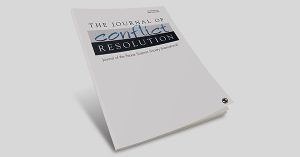 Kushi, S., & Toft, M. D. (2023). Introducing the Military Intervention Project: A New Dataset on US Military Interventions, 1776–2019. Journal of Conflict Resolution, 67(4), 752–779.
Kushi, S., & Toft, M. D. (2023). Introducing the Military Intervention Project: A New Dataset on US Military Interventions, 1776–2019. Journal of Conflict Resolution, 67(4), 752–779.
While scholars have made many claims about US military interventions, they have not come to a consensus on main trends and consequences. This article introduces a new, comprehensive dataset of all US military interventions since the country’s founding, alongside over 200 variables that allow scholars to evaluate theoretical propositions on drivers and outcomes of intervention. It compares the new Military Intervention Project (MIP) dataset to the current leading dataset, the Militarized Interstate Disputes (MID). In sum, MIP doubles the universe of cases, integrates a range of military intervention definitions and sources, expands the timeline of analysis, and offers more transparency of sourcing through historically-documented case narratives of every US military intervention included in the dataset. According to MIP, the US has undertaken almost 400 military interventions since 1776, with half of these operations undertaken between 1950 and 2019. Over 25% of them have occurred in the post-Cold War period.
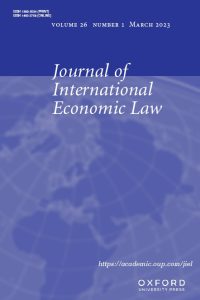 Trachtman, Joel “Platforms of Global Governance: Globalization on Steroids” Journal of International Economic Law, Volume 26, Issue 1, March 2023, Pages 78–89
Trachtman, Joel “Platforms of Global Governance: Globalization on Steroids” Journal of International Economic Law, Volume 26, Issue 1, March 2023, Pages 78–89
Platforms constitute a novel context for social interaction. Physical distance makes little to no difference to interaction, and so the frequency and intensity of cross-territorial border interaction grow dramatically. This growth in interaction will be globalization on steroids. Platforms increase both collision among national rules (jurisdictional collision) and collision at the international level among functional rules (fragmentation). Revised normative and organizational tools will be needed to manage the increased globalization and fragmentation resulting from the rise of platform commerce. These tools may include modifications and extensions of existing rules of trade law, but they will embrace other areas of regulation in a much more nuanced manner than has been necessary until now. The existing fragmentation or ‘siloed’ nature of our international trade and regulatory systems will need to be modified—lateralized—to allow a more coherent approach.
2022
The Russian Federation is currently in the second phase of what appears to be a war of aggression against Ukraine. While Russia’s invasion is widely thought to satisfy the threshold of the crime of aggression, the routes to accountability for this crime are unclear: The International Criminal Court lacks jurisdiction and domestic courts offer an uncertain alternative. Therefore, Ukraine and a chorus of others are advocating the creation of a special tribunal. This piece explores the options as well as the arguments that speak in favour and against establishing such a special tribunal for the crime of aggression.
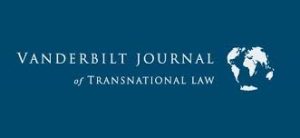 Dannenbaum, Tom, Criminalizing Starvation in an Age of Mass Deprivation in War: Intent, Method, Form, and Consequence, 53 Vanderbilt Journal of Transnational Law 681 (2022)
Dannenbaum, Tom, Criminalizing Starvation in an Age of Mass Deprivation in War: Intent, Method, Form, and Consequence, 53 Vanderbilt Journal of Transnational Law 681 (2022)
Mass starvation in war is resurgent. Across a range of conflicts, belligerents have attacked farmers and humanitarian workers; destroyed, looted, or rendered unusable food and food sources; and cut off besieged populations from the external supply of essential goods. Millions have been left in famine or on the brink thereof. Increasingly, this has elicited calls for accountability. However, traditional criminal categories are not promising in this respect. The situation and nature of objects indispensable to survival is such that they typically provide sustenance to both civilians and combatants; the conduct that deprives people of those objects often involves acting on the objects, rather than acting directly on the affected persons; and the causal chain from deprivation to civilian suffering is long and complex. Appropriately, then, attention has turned instead towards the recently codified and largely untested war crime of starvation of civilians as a method of warfare. Whether and how this framework can underpin a legal response to mass deprivation hinges on how key debates as to the crime’s meaning are resolved. Entering those debates, this Article debunks the common view that the starvation crime attaches only to conduct that seeks to weaponize civilian suffering. Instead, it presents an alternative theory according to which the crime should be understood transitively as focused primarily on the act of deprivation, rather than the outcome it produces. This approach would reshape how to think about the crime, with particularly acute implications for the regulation of sieges and blockades
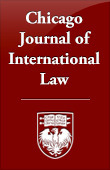 Dannenbaum, Tom, Siege Starvation: A War Crime of Societal Torture, 22 Chicago Journal International Law 368 (2022)
Dannenbaum, Tom, Siege Starvation: A War Crime of Societal Torture, 22 Chicago Journal International Law 368 (2022)
A recent amendment to the Rome Statute of the International Criminal Court has drawn unprecedented attention to the war crime of starvation of civilians as a method of warfare. It comes at a time when mass starvation in war is resurgent, devastating populations in Yemen, Ethiopia, Syria, South Sudan, Nigeria, and elsewhere. The practice has also drawn the scrutiny of the United Nations Security Council. And yet, despite this heightened profile and sharpened urgency, what precisely is criminally wrongful about starvation methods remains underspecified.
A common way of thinking about the criminal wrong is as a form of killing or harming civilians. Although its differentiating particularities matter, the basic wrongfulness of the crime inheres, on this view, in it being an attack on those who ought not be attacked. For some, this supports a broad interpretation of the starvation ban. However, for others, the graduality of starvation preserves the continuous possibility of the avoidance or minimization of civilian death or harm in a way that direct kinetic attacks do not. In combination with the method’s purported military utility, this distinctive incrementalism has underpinned arguments for the permissibility of certain forms of siege and other deprivation and a narrow interpretation of the starvation crime.
Drawing on the moral philosophy of torture, this Article offers a different normative theory of the crime. Starvation, like torture, is peculiarly wrongful in its distortion of victims’ biological imperatives against their capacities to formulate and act on higher-order desires, political commitments, and even love. This process does not merely raise the cost of fulfilling those commitments. Instead, starvation tears gradually at the very capacity of those affected to prioritize their most fundamental commitments, regardless of whether they would choose to do so under the conditions necessary to evaluate matters with a “contemplative attitude.” Rather than palliating, the slowness of starvation methods is at the crux of this torturous wrong. Recognizing this redefines the meaning and place of the crime in the framework of international criminal law.
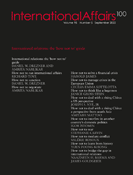 Drezner, Daniel “How Not to Sanction.” International Affairs, Volume 98, Issue 5, September 2022, Pages 1533–1552
Drezner, Daniel “How Not to Sanction.” International Affairs, Volume 98, Issue 5, September 2022, Pages 1533–1552
In the past century economic sanctions have emerged as a prominent ‘off the shelf’ tool of diplomacy. This article examines two of the most high-profile failures in the history of economic sanctions: the United Nations sanctions against Iraq between the two Gulf wars, and the Trump administration’s re-imposition of sanctions on Iran beginning in 2018. The technology of economic statecraft changed considerably between these two cases, indicating significant policy learning. In both instances, however, the sanctions imposed crippling costs on the target state without any observable concessions. In neither case was the primary goal achieved, and the negative policy externalities were considerable. An autopsy of these failures reveals three cautionary warnings. First, the recipe for sanctions success is not merely a function of the ability to impose costs on the target state. Second, an underappreciated impediment to the successful use of economic statecraft is a failure to articulate clear and consistent demands. Third, tight linkages between scholars and policy-makers can lead to improved policies in the short term, but long-term political imperatives within great powers can pervert such successes.
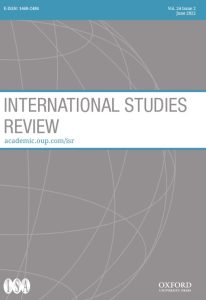 Drezner, Daniel; “The Death of Democratic Advantage” International Studies Review, Volume 24, Issue 2, June 2022, viac017
Drezner, Daniel; “The Death of Democratic Advantage” International Studies Review, Volume 24, Issue 2, June 2022, viac017
International relations scholarship has posited multiple pathways through which democracies accrue advantages in world politics. These range from enhanced warfighting capabilities to sovereign borrowing capacity to more constructive cooperation with like-minded regimes. A series of crises over the past generation, however, have called these advantages into question. This paper re-examines the key conceptual pillars underlying the democratic advantage in world politics. Scholars have posited that democracies possess inherent advantages in credible commitment mechanisms and public goods provision. The rise of populism has eroded these underlying advantages. Furthermore, the rise of China threatens to hamper the network effects that enhance democratic flourishing at the global level. Whether the democratic advantage is real and sustainable should be one of the defining political science research programs of this century.
We examine the design of governance in international nongovernmental organizations (INGOs) engaged in global advocacy. A central governance challenge facing INGOs is how to integrate their global advocacy efforts across diverse country units and memberships, in the face of limited authority and weak ownership over those units. Through a qualitative multi-case study of ten organizations, we analyze governance reforms intended to enhance global integration. We identify and discuss: a) four distinct governance structures for enabling more coherent global decision making (federation, confederation, network, constituency backbone); b) various mechanisms of formal and informal authority employed by headquarters in order to integrate the diverse interests and actions of their units; and, c) decision rights allocated to units or members to secure commitment to global goals. We synthesize these findings to offer a contingency perspective on designing governance for global integration. We hope this research will not only help to advance scholarship on governance in complex global organizations, but will also be useful to the leadership and boards of international organizations in strengthening the collective voice of their diverse constituencies.
As the range of actors, issues and levels of negotiation at the COP26 meeting in Glasgow demonstrates, the defining feature of global governance today is pluralism. Geopolitics, including swings in US global leadership and surging US–China competition, are part of the picture, but do not adequately explain the complexity of contemporary multilateralism. Deeper, systemic forces are at work – the birth pains of a more plural global system. This article identifies and examines four dimensions of pluralism: multipolarity, multiple issues, multi-level governance, and multiple stakeholders. The effect is that all states – including middle and small states – must be more active, more agile, more self-reliant, more willing to lead, and more oriented towards issues than ideology. The article illustrates the four dimensions through reviews of multilateral responses to COVID-19, cyber attacks, and mass migration, before asking how states and non-state actors can effectively manage a more plural system of governance. Three capacities for success are discussed: to act early and decisively by finding partners and fora for success; to embrace adhocracy internally and externally; and to rebalance effectiveness and trust through greater technocratic expertise, transboundary scientific cooperation, and a more inclusive diplomacy.
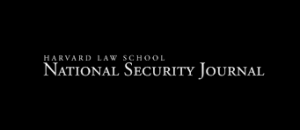 Kostyuk and S. Landau, Dueling over Dual EC DRBG: The Consequences of Corrupting a Crypto- graphic Standardization Process, Harvard National Security Journal, Volume 13, Issue 2, 2022, pp. 224-284.
Kostyuk and S. Landau, Dueling over Dual EC DRBG: The Consequences of Corrupting a Crypto- graphic Standardization Process, Harvard National Security Journal, Volume 13, Issue 2, 2022, pp. 224-284.
In recent decades, the U.S. National Institute of Standards and Technology (NIST), which develops cryptographic standards for non-national security agencies of the U.S. government, has emerged as the de facto international source for cryptographic standards. But in 2013, Edward Snowden disclosed that the National Security Agency had subverted the integrity of a NIST cryptographic standard—the Dual_EC_DRBG—enabling easy decryption of supposedly secured communications. This discovery reinforced the desire of some public and private entities to develop their own cryptographic standards instead of relying on a U.S. government process. Yet, a decade later, no credible alternative to NIST has emerged. NIST remains the only viable candidate for effectively developing internationally trusted cryptography standards.
Cryptographic algorithms are essential to security yet are hard to understand and evaluate. These technologies provide crucial security for communications protocols. Yet the protocols transit international borders; they are used by countries that do not necessarily trust each other. In particular, these nations do not necessarily trust the developer of the cryptographic standard.
Seeking to understand how NIST, a U.S. government agency, was able to remain a purveyor of cryptographic algorithms despite the Dual_EC_DRBG problem, we examine the Dual_EC_DRBG situation, NIST’s response, and why a non-regulatory, non-national security U.S. agency remains a successful international supplier of strong cryptographic solutions.
2021
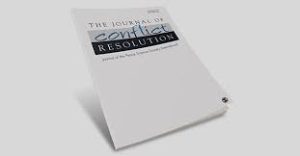 Monica Duffy Toft, 2021. “Getting Religion Right in Civil Wars,” Journal of Conflict Resolution, Peace Science Society (International), vol. 65(9), pages 1607-1634, October.
Monica Duffy Toft, 2021. “Getting Religion Right in Civil Wars,” Journal of Conflict Resolution, Peace Science Society (International), vol. 65(9), pages 1607-1634, October.
Surveying civil war in the world today is striking in terms of how often religious cleavages and grievances have become central to armed conflict. How are the causes and outcomes of religious civil wars different than other civil wars, if at all? Is Islam implicated for the contemporary surge in religious civil war? The first section reviews the literature and addresses the importance of religion for civil war. I then introduce a dataset and describe key trends in religious civil war in the third section, while in the fourth section I present tests of whether Muslim or Arab Muslim societies in particular are more prone to religious strife. The paper concludes with a discussion of the implications of the main findings.Link:
2020
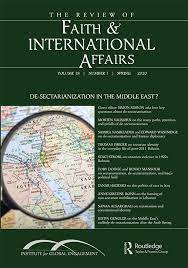 Toft, Monica. (2020). R. Scott Appleby and the Power of Framing. The Review of Faith & International Affairs. 18. 112-114.
Toft, Monica. (2020). R. Scott Appleby and the Power of Framing. The Review of Faith & International Affairs. 18. 112-114.
What makes R. Scott Appleby’s work so powerful is its ability to frame ideas and issues in simple, but compelling, ways. As a scholar and aspiring theorist of ethnicity and nationalism, I found there was little differentiation in the literature of the varied ties that bind individuals to identity groups. Language, race, and religion were treated as undifferentiated motivators under the rubric of “ethnicity.” Different aspects of identity were not parsed and therefore were not considered as critical in explaining political, violent behavior. Appleby’s understanding of religion was crucial to me as I tried to understand and unpack powerful political events around the world. It led me to understand that religious actors think and behave differently than nationalist actors, with real-world consequences, sometimes bad, sometimes good. Armed with this understanding, I was able to better research different identities to find out when they might contribute to peace or violence.
Modern geopolitics includes measures short of armed conflict designed to control decision-making in, and action by, target states. One increasingly significant category of these measures involves attacks by foreign states against civil society institutions in target states. Liberal states that seek to protect their civil societies from this interference seek to bolster civil society defences, to determine the origin of and respond to attacks and to deny relevant tools to potential attackers. With the rise of cyberspace, target states using purely territorial measures are increasingly impotent to protect their civil societies from foreign governmental hacking. Denying access to advanced hacking software by antagonist foreign states may assist in protecting target state civil societies. This article explores the possibility of denying hacking tools to potential attackers, identifies some of the problems and proposes a refinement of export controls that will permit greater protection with less disruption of desirable software development.
2019
International diplomacy is defined as the use of skill and tact in negotiating international relationships and agreements. By that definition, the current president of the United States, Donald Trump, is not a diplomat. He is a bully who employs classic hard bargaining tactics and claims victory even when demonstrably losing. But will his style of negotiating have any lasting effects on international diplomacy in the future? The answer is yes, in three important ways.
First, Trump’s divisive, us-against-them negotiating style signals to other national leaders that the United States (i.e., ‘us’) will no longer defend human rights or the interests of minority groups (i.e., ‘them’). This then gives leaders a free pass for discriminatory speech and action, including against refugees. Second, his administration will leave behind a weakened U.S. international reputation because of its contempt for cooperation, bullying of allies, and embracing of tyrants. Most significantly, Trump is working diligently to hobble, possibly even destroy, the international institutional architecture through which diplomacy is often conducted. Other states are seeking to preserve some of these institutions, but it’s not yet clear if they will succeed.
2018

We show a statistically significant and quantitatively meaningful decline in the aptitude of commissioned officers in the marine corp from 1980 to 2014 as measured by their scores on the General Classification Test. This result contrasts with the widely studied increase in the quality of enlisted personnel since 1973 when conscription ended. As a possible cause for this decline, we focus on the fact that, during this period, marine officers had to have a 4-year college degree and there has been an expansion of the pool of young Americans in college. To corroborate this hypothesis, we show that there has been a similar decline in scores on the Armed Forces Qualification Test for responders to the 1979 and 1997 National Longitudinal Surveys of Youth among college graduates but not for the overall set of respondents.
2017
This policy note discusses the hopes and fears generated by the ‘responsibility to protect’ (R2P) agenda, as strongly influenced by the intervention in Libya and lack thereof in Syria. Based on that analysis, it offers a prescription for R2P moving forward, suggesting that it move away from coercive intervention to a strategy of diplomacy and prevention.
International Law Practicums
2023
A new report finds that hundreds of thousands of children living in opposition-held areas in Northwest Syria are being denied access to their rights to nationality and legal identity, resulting in profound deprivations of their most basic rights. As the report documents, if their rights to nationality and legal identity are not ensured, these children, and the adults they become, will remain living on the margins, vulnerable to the harms associated with exclusion and statelessness.
2022
“While in recent decades many countries have increased and arguably normalized the use of immigration detention for children, Thailand—with a large migrant and refugee population and record of detaining thousands of such children annually—is moving towards ending the practice and expanding alternatives. Thailand, a non-signatory to the 1951 UN Refugee Convention, has explicitly grounded its approach in Thai and international law’s best interests of the child principle—that is, that in all actions concerning children, the best interests of the child are to be a primary consideration. Indeed, after years of advocacy and engagement on the
part of Thai non-governmental organizations (NGOs), international NGOs (INGOS), and United Nations organizations, Thai Prime Minister Prayut Chan-o-cha pledged at the 2016 Leaders’ Summit on Refugees in New York that Thailand would end immigration detention of children and, more broadly, institute a new National Screening Mechanism (NSM) to distinguish undocumented migrants in need of international protection from economic migrants, allowing such persons to remain in the country on at least a temporary basis.”

